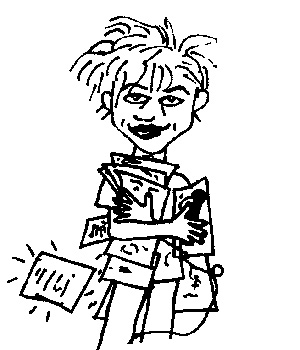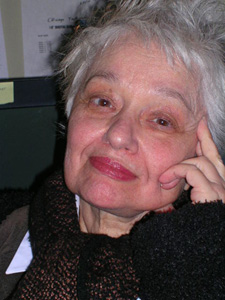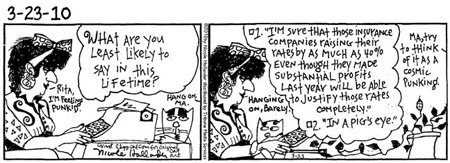| « Author Joanna Wilson, Your Christmas TV Companion | What Are Your Snowmen Like? » |
Bookmarks Tue Dec 14 2010
One-Shots: Nicole Hollander
It's One-Shots' first newspaper comic artist! Nationally syndicated, Chicago-born cartoonist Nicole Hollander has been discussing everything from politics to relationships to cats through the funny, insightful, at times snarky and sardonic cast that makes up Sylvia. For the past three decades, her feminist wit and quirky charm have made their way into books, publications, and papers, sketching observations on American life and culture in a heavy, curving black line.
It hasn't been a smooth path -- throughout Nicole's career, she faced sexism not only as a woman, but as a woman working with humor. We talked about her graphic design beginnings, her recent entry into blogging, and how the character of Sylvia is both a Chicago woman of an earlier era, yet very much of any time.
This year, Nicole released The Sylvia Chronicles: 30 Years of Graphic Misbehavior from Reagan to Obama. She talks about this and more on WTTW's Chicago Tonight, 7pm CST.
Name: Nicole Hollander
Job: Syndicated cartoonist (Sylvia) and Blogger
Age: 71
Education: MFA
Awards: Wonder Woman Award, 1984
Location: Roscoe Village
Hometown: Chicago
Website: http://www.badgirlchats.com
Favorite place in Chicago: Any funky café with good coffee.


Self-portrait
Were you always, or ever, into comics?
You mean as a child?
Sure, or any time.
You know, I wasn't. I learned how to read so that I could read the Sunday comics. I was not in school yet, and I think my parents got tired of reading them to me, and they taught me how to read so I could read the comics. I think that around 14 or so, when I was an adolescent, I didn't see that the comics had any relevance to me. I mean, I wasn't into adventure or superheroes, because I wasn't a boy. Or a girl who was interested in adventure or superheroes. So I stopped reading comics.
I think what happened was that I...became a graphic designer. I went to art school, got a Master's in Fine Arts. But I never completely liked painting, because I didn't like standing alone in front of a canvas, I was more social than that. And really, it is -- especially with me, when I was younger -- it was a bleak thing, you'd look at that canvas and think about what was going on in your psyche, and you would paint it and it would be kind of scary and distorted and that kind of thing, and not at all social. So I started to think about how could I possibly combine my interest in art with something that had more to do with the rest of the world, with community. Because that was part of my family. We were political in the sense that we were aware that some people, through no fault of their own, did not have it as good as other people. My father was in the union, my mother worked in a hospital. That was part of my growing up, that you're part of a community, and you want to be, and you want to give something to them.
So, I struggled with finding what would match me. I thought about being an art therapist, and I talked to the dean at the school, and he said you could do that, but you would never be an artist, that would be what you would do. I somehow fell into becoming a graphic designer. I really don't know how that happened, but that's what I was.
When was that?
It would be in the '70s. I worked for all not-for-profit organizations. I had a lot of fun with them. I worked for the ACLU when they had an office, and then I would write things about the auction items and suggest things about the auction items. I had much fun doing it -- there was no money. Then two women called me who ran a feminist publication. It was called The Spokeswoman. And they wanted me to redesign what was essentially a newsletter into something that looked like a real magazine with a cover. It was terrific, it was national, it was legislation, education, health, and so I did that. Then through a fluke, they moved into my office because they were evicted, and I started doing illustrations for them, because we were working together, and that's what I wanted, political illustration -- I really wanted to do something political and fun at the same time. That's a hard combination, because political editorial cartoons are not funny, normally. You have to create it yourself.
Anyway, they moved in and I started to do these illustrations, and a lot of them had to do with angry women and judges who looked like pigs with their little hooves, showing from under the bench. And then, one day I just did a comic strip. I had no idea that I was going to do that, and I did it, it was only once a month because they were a monthly publication. It didn't improve very quickly, but that was the beginning of Sylvia, that character began there.
What were your influences in creating her?
Unconscious influences. She's my mother's generation, my mother's pals. My mother was a great believer in friendship -- I know you can't say believer in friendship, she had a lot of friends, she liked her friends, they counted on each other. I learned that from her, it was a really big message that she gave me, that your friends are really important to you. It will last if you make it last.
Sylvia was modeled after [her friend] Esther because of the way she looked. She was very...she sort of had a wicked look in her eye. I joke that Sylvia doesn't stand up, but if she did she would be built like Esther, she would have a high waist and big breasts and long legs, but since she doesn't stand up, no one can prove it. I can't prove it.
You're originally from Hyde Park. Were you living here at the point when you approached the Sun-Times?
I have lived most of my life in Chicago. I spent some time when I was married and going to school in Boston. And then I always wanted to live in California, so after I was divorced I went and lived in Berkeley, because I liked college towns -- there was so much stuff to do.
And then I came back.
Why did you come back here?
I think I couldn't find a job in California. I had a series of part-time jobs and I just couldn't continue to do it, so I came back. And that's when I became a graphic designer.
Having a website and going online -- what benefits have you seen? Any you hadn't anticipated?
Yeah, I love it. That's the benefit. It's -- when you do a cartoon strip, you're four weeks in advance, that means that if you have an idea, it's going to be a month before that idea's out there, so you have to be very careful to couch it in terms of it'll still be fresh. And so I had to create a character even for those kinds of situations, a woman who lies in her journal, because she could say I've been thinking about this for a month, or I've been trying to call so-and-so for a month, and that places it in the past and the future.
But otherwise you have to pick something that's going to be around for awhile or something that's universal, something that people are interested. Like, anything cats do.
Cats are popular on the Internet.
Relationships, people's relationships. You've got a president that's going to be there four years, you can go with that for awhile. So I did that, but a blog, I can look at something today (it's not the best thing to do because it means you're really rushed, and I can have it in this week. So I like that. And I'm learning how to write in a different way -- you have to write in a different way. Because a cartoon -- you have to think of who's saying it, and the reaction of the person they're saying it to -- but in a blog, it's you. It's come to that, I've set it up so that Sylvia talks, then I'm talking -- we bounce back off of each other, because our personas are different. And then, I realize that blogs are not a short story. You have to write in a different way, so I'm trying to write in a way that's more immediate, so I'm changing my writing style somewhat. But my attitude is still the same.













